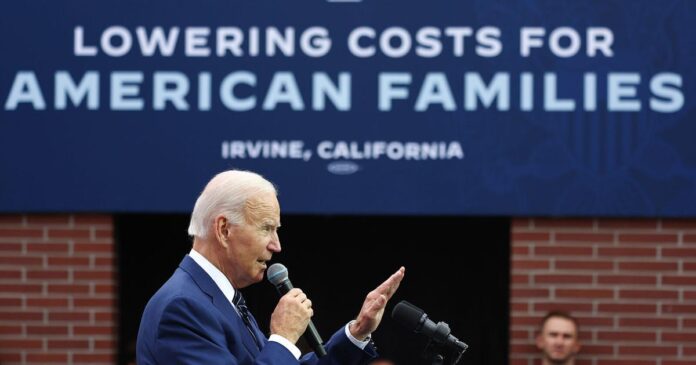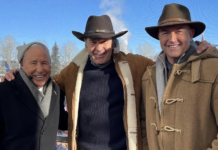Brewing craft beer since 1994, Legend Brewing is the oldest craft brewery in Virginia and still innovating and growing. 8@4 is presented by Massey Cancer Center from the Virginia Wayside Furniture studio.
Sometimes the quieter political issues have more to say. High-decibel culture warriors have been getting people riled up over everything from Disney’s “The Little Mermaid” remake to a woman playing a flute. But more important things are going on right now, such as the highest inflation in 40 years. And there are healthier outlets than politics for releasing pent-up anger.
Outrage makes sense as a business strategy, driving clicks and revenues. But it bombs as a political strategy. Poll after poll finds that voters prioritize inflation and the economy over the culture wars. One reason is that culture warfare distracts attention away from real issues. Another is that it conditions people to think in terms of us-against-them, and most people are sick of polarization.
For example, inflation is easily the most important issue in the country right now. It costs the typical household about $2,000 per year. People must spend more on gas (up 18% from last year), groceries (up 13%) and other essentials, leaving less for savings, travel and other priorities.
People are also reading…
It also doesn’t fit partisan lines, so it doesn’t fit the outrage model. Inflation has to do with the number of dollars in existence, and neither party has much control over that. That responsibility lies with the Federal Reserve. Rather than partisan combat, people should focus on what caused the problem and how to fix it.
When COVID-19 hit and people hunkered down, consumer spending cratered. The Fed tried to make up for it by boosting the money supply. The problem is that they overdid it, and over the next two years, they grew the money supply by 40% while real output grew by just 4%.
That massive imbalance literally changed the exchange rate between dollars and real goods. That alone caused most of today’s inflation. The solution is to get the money supply back in balance with real output.
Supply chain problems and oil shocks have separately raised some prices. Congress and President Joe Biden can help somewhat with these issues with tariff relief, speeding up permits for new energy and infrastructure projects, and regulatory reform.
Instead, a series of bipartisan trillion-dollar spending bills from Congress and Presidents Donald Trump and Biden have made the Fed’s job harder than it already is. But inflation still comes down to the money supply, which only the Federal Reserve can adjust.
Culture warriors’ us-against-them partisanship doesn’t help the Fed solve that problem or persuade Congress to spend more responsibly.
The good news is that the Fed has taken steps to get the money supply back in sync with the real economy in recent months. But even in the best-case scenario, inflation will stay high into next year. The price of the Fed fixing its mistakes may even be a recession.
That is far more important than someone kneeling at a football game. Yet which one gets people fired up?
Culture warriors succeed in politics because the human brain is wired to respond to threats. We can’t help it. Evolution itself is partly to blame for today’s divisive politics. People naturally focus on simple stories with names and faces, not more important issues like inflation, which are often more abstract.
If anything, outrage culture emboldens politicians because voters will be so busy shouting at each other that they are less likely to notice the bad policies coming from Washington.
Young
While everyone has these reptile brain tendencies, some self-awareness can help us overcome them. If someone is clearly just trying to get people riled up, don’t give them that power. Turn off cable news. Be aware that not every political issue is an us-against-them issue. Know that it’s OK not to have an opinion on every issue. Focus instead on a few issues you’re passionate about, and get involved with those.
Politics and policy are two very different things. Politics is about winning elections. Policy is concerned with finding solutions to problems. This election, let’s focus less on politics and more on policy. Pay more attention to James Madison’s ideas and less to who plays his flute.
From the archives: 100 photos of Pony Pasture

05-08-1989: Aqua cycling–Mark Oliver (left), 20, and his 16 year-old brother, Justin, drove down to Riverside Drive from the Fan district yesterday to look for “aqua cycling” challenges. Here, they pedal through flood waters in the parking lot of Pony Pasture. Richmond police had closed off sections of about 10 streets yesterday because of flood waters.

Fishing the James River is a natural pasttime and has been for as long as there have been inhabitants in the area. Here, Dale Huggins tries to lure a fish in on fly rod near the Pony Pasture. July 11, 1998

Dam between Huguenot Bridge and the Pony Pasture. July 2, 1998

Courtney Webb, 16, meets ‘Bo-Bo’ while enjoying a day off from school, Tuesday, May 26, 1998 at the Pony Pasture section of the James River. Courtney and other students flocked to the river to enjoy a ‘snow day.’ She is a student at Manchester High School.

Local high school students flocked to the Pony Pasture section of the James River on Tuesday, May 26, to take advantage of a ‘snow day.’ (Since local schools did not have to use any ‘snow days’ since snow did not cause any school closings this winter, Tuesday was a day off.

Sandra Slocum and her son, Brooks, 6, cool off in a puddle of the James River at the Pony Pasture area of James River Park. They and Brooks’ brother, Phil, 8, spent part of the afternoon having fun and checking out the low water conditions created by the current drought. It was the boys’ first romp in the river.

Kristi McCullough and her ten-month-old son Andrew took a break from errands to enjoy the warm weather at Pony Pasture Thursday, February 10, 2000. They live in Chesterfield.

With just a few days left before the summer ends and school begins, Godwin High School senior Ashley Gill and her boyfriend, Stephen Serge, spend a day on the rocks at the Pony Pasture, a popular summer hangout for students. Serge attends a private school in Hampton, Virginia, so the two will see less of each other when school begins.

Cheryl Richards, 20, right, tries to coax Gracie, her 17-week-old Beagle mix puppy, into the James River at the Pony Pasture Friday, July 20, 2001. Gracie was less than thrilled with the water and later had to be carried back to dry land.

People enjoying the James River at the Pony Pasture . A report issued by the state Department of Envrionmental Quality says that the Pony Pasture and other parts of the James are too polluted with fecal bacteria to be fit fit for swimming . July 18 , 2002

A dog plays in the James River at the Pony Pasture . A report issued by the state Department of Envrionmental Quality says that the Pony Pasture and other parts of the James are too polluted with fecal bacteria to be fit fit for swimming . July 18 , 2002

These swimmers on rocks in the James River at the Pony Pasture in Richmond, VA, were ignoring several signs posted in the immediate area warning against swimming, since the river was over five feet over flood stage Monday, July 7, 2003.

Jos Munos enjoys the dryer weather by skip’s rocks at Pony Pasture with his friends Monday, June 9, 2003.

Elizabeth Esfahani relaxes at pony pasture Wednesday, August 20, 2003.

The Pony Pasture proved to be just the right spot to cool off for Norma Ryan and a friend’s children. From left: Emilio Lyton, 6; Raquel Lyton, 4; Norma Ryan; Sabrina Lyton, 2; and Catalina Lyton, 8.

Low water on the James River near Pony Pasture . October 10 , 2007

Warm weather brought bathers to Pony Pasture on 8/3/07.

Riverside Dr. , shot near Pony Pasture , is being proposed to be designated as Virginia’s first urban scenic byway. December 24 , 2008

A goose glides through fall colors reflected in the James River along Riverside Drive near the Pony Pasture.

The Pony Pasture rapids of the James River. JAMES RIVER JOURNAL

As the sun starts to illuminate fog on the James River, a photographer waits for just the right moment on the rocks of the Pony Pasture lower rapids.

Sunrise at the Pony Pasture section of the James River.

Sunrise on the James River lights up the stepping stone-like highly accessible area of the James River known as the Pony Pasture.

With the arrival of cold air, mixed with relatively warm water, fog forms on the James River in the lower rapids of Pony Pasture. The Carillon tower is in the background.

A canine visitor to the dog-friendly Pony Pasture jumps (successfully) to a rock.

Jamie Wilbar, 13, of Glen Allen, leaps from a rock at Pony Pasture for what might have been his last James River swim of the year.

Jamie Wilbar, 13, of Glen Allen, jumps into the rapids at Pony Pasture for what might have been his last James River swim of the year.

Despite written warnings that swimmers must wear life jackets, river-goers play in the water at Pony Pasture Rapids, in Richmond, on June 02, 2009.

A couple heads for the Pony Pasture along the James River in Richmond, VA Monday, June 8, 2009.

Jumping into the James was the rule of the day for many who flocked to the Pony Pasture on Memorial Day.

Swimmers at Pony Pasture watched the Regional training of the Tactical Rescue Teams doing a quarterly drill and swift water awareness course on Aug. 4. Morning showers gave way to another hot humid day. Richmond, Henrico, Chesterfield, Hanover agencies were involved in the river rescue training.

Participants in the “Dive & Draw!” program head into the James River near Pony Pasture on Saturday. The program, a collaboration between Chesterfield County Environmental Engineering and Friends of the James River, is designed to promote stewardship of the river.

Lorne Field of Chesterfield county’s Environmental Engineering department talks of algae blooms during a “Dive & Draw!” event in the James River near Pony Pasture on Saturday. The program, a collaboration between the Chesterfield County agency and Friends of the James River, is designed to promote stewardship of the river.

Participants in the “Dive & Draw!” program head into the James River near Pony Pasture on Saturday. The program, a collaboration between Chesterfield County Environmental Engineering and Friends of the James River, is designed to promote stewardship of the river.

The James River, downstream a few hundred yards from the Pony Pasture, on Richmond’s southside.

Med-Flight paramedic David Powell, with Chesterfield County Fire, grabs a ‘cinch’ vest lowered to him from a Virginia State Police helicopter during a training exercise in the James River in Richmond Tuesday afternoon. Firefighters, paramedics and pilots with Med-Flight ran through medical evacuation drills near the Riverside Meadow Greenspace along Riverside Drive, near the Pony Pasture. Two choppers were involved in the drills.

Med-Flight paramedic David Powell, with Chesterfield County Fire, hangs from a ‘cinch’ vest om a cable hanging from a Virginia State Police helicopter during a training exercise in the James River in Richmond Tuesday afternoon. Firefighters, paramedics and pilots with Med-Flight ran through medical evacuation drills near the Riverside Meadow Greenspace along Riverside Drive, near the Pony Pasture. Two choppers were involved in the drills.

Waterfowl in the James River’s Pony Pasture catches the attention of swimmers, June 30, 2012.

The ever-popular Pony Pasture area of the James River draws hundreds on warm summer days. Sept. 1, 2012.

After putting his head into the cold water at Pony Pasture, Luke Logan, 9, emerges during the Polar Bear Plunge, Jan. 1, 2013.

Lorene Davidson and a family friend, Rachel Cryster, 11, bundle up to keep warm after jumping into the frigid water of the James River at Pony Pasture for the annual Polar Bear Plunge, Jan. 1, 2013.

Fog covers the James River across from Pony Pasture Monday afternoon, January 15, 2013.

Mike Martin kayaks in the James River near Pony Pasture Thursday, May 9, 2013.

Amelie Williams, 9, climbs across a log at the James River Parks’ Pony Pasture a few minutes after the winter solstice hit at 12:11 pm Saturday, Dec. 21, 2013. She and some of her friends were enjoying the unseasonal weather.

Nicole Harrison of Durham celebrates to recorded music Funk Brothers played at Pony Pasture on Riverside Drive during the Richmond Marathon Saturday, November 15, 2014.

James Richardson, center foreground, misses his tube as he and his friends, all of Yorktown,from left, Raychel Blanchette, Bryce Burgner, and Devin Lapp visit Pony Pasture Rapids, part of The James River Park System, for tubing in Richmond on Monday, June 16, 2014.

A video camera stationed in James River Park caught these river otters between the Huguenot Bridge and Pony Pasture Rapids in South Richmond. A project that started last spring is using video to document wildlife in the park.

Many sought refuge from the heat by jumping into the James River at the Pony Pasture, June 23, 2015.

Kayakers start their guided tour by Riverside Outfitters at Pony Pasture in Richmond on Tuesday, June 30, 2015.

Lucas Crain and his five-year-old daughter McKenzie Crain head back to their car after taking a cooling dip in the James River at the Pony Pasture in Richmond, VA Monday, August 24, 2015.

(L-R) Emmett Shreve, age 3, his friend Alice Hunter, age 4, and her cousin Ford Hunter, age 3, watch the churning waters of the James River at Pony Pasture after the river rose to over nine feet Sunday, October 4, 2015.

Deepannita Hossain, left, 22, and Sahba Abolfazli, right, 22, (cqbb both names) both senior chemical engineering students at UVA, pause to watch the James River flow by the Pony Pasture area in Richmond, VA Thursday, Nov. 5, 2015. Hossain is a native of Bangaladesh and Abolfazli is a native of Iran.

Interpretive signs for the John Smith Trail are located at a few historic sites around Richmond, including this one on at Pony Pasture Rapids Park. Photo taken Nov. 11, 2015.

His first visit to the Pony Pasture rapids, part of the James River Park System, and Wyatt Lifsey said he picked a good day to relax. He moved to Richmond from Blacksburg, Va. about one month ago. April 21, 2016.

Oeuyown Kim (left) and friend Morgan Moore relax with drinks in the James River at the Pony Pasture early Saturday evening before a thunderstorm rolled through. Aug. 6, 2016

Two young women jump off a log into the James River at the Pony Pasture area in Richmond, VA Thursday, August 11, 2016 as high temperatures and humidity caused many people to head to the river to cool off.

Geoffrey Zindren of Richmond makes his way to a spot for fishing at Pony Pasture in Richmond on Tuesday, September 13, 2016. Zindren said he doesn’t expect to catch any fish but this is his excuse to be out more often.

With temperatures in the mid-80’s, fall break for these VCU students has been feeling more like summer vacation. The six friends (and a dog named Leona, lower left) spent part of the afternoon reclining and eating cookies at the Pony Pasture along Riverside Drive. From left: Muneera Hassan, Tiffany Tran, Connie Tran, Igor Tsvetkov, Isaiah Klimek, and Samantha Muehlbauer. Oct. 20, 2016

Ryan McKinnon and his dog Rudy sit on a rock at Pony Pasture on Sunday May 29, 2016.

Rudy took her first plunge into the James River at Pony Pasture on Sunday May 29, 2016 and jumped right back onto the dry rock after her owner Ryan McKinnon pulled her into the water with him.

Driftwood and high river levels kept many of the popular granite boulders hideen at Pony Pasture Rapids, May 16, 2016.

A prothonotary warbler. The small songbird was spotted by bird watchers along the James River at the Pony Pasture section of James River Park. May 11, 2016.

Barbara Eck (left) and Alice Boller look for birds along the James River at the Pony Pasture, May 11, 2016. The two joined a few other local birders there Wednesday morning.

Lightning Bug at Pony Pasture in Richmond on June 20, 2017.

The James River in Richmond, VA offered some relief from the upper 90’s heat Thursday, July 13, 2017 to many folks who visited the Pony Pasture rocks.

This couple had a little difficulty getting their dog interested in entering the water at the Pony Pasture area of the James River in Richmond, VA Thursday, July 13, 2017. The dog eventually entered the water and appeared to enjoy it.

A couple share a quiet moment on the Pony Pasture rocks in the James River in Richmond, VA Monday, August 7, 2017.

A group of swimmers enjoy a cooling dip in the water along the Pony Pasture rocks in the James River in Richmond, VA Monday, August 7, 2017.

Canada geese appear to be performing a water ballet in the Pony Pasture area of the James River in Richmond, VA Monday, Oct. 9, 2017. The geese were actually feeding on underwater plants.

Some land along the James River in Richmond’s West End was recently cleared, and state officials say the work violated a law requiring that a 100-foot buffer of natural vegetation be maintained along the river to protect it from pollution. The home of Stuart and Dawn Siegel sits above the cleared area. City officials say the Science Museum of Virginia Foundation, which allowed Siegel to have the work done, is responsible because it owns the land. This view is from the Pony Pasture Rapids section of James River Park in South Richmond. Pic taken 11/17.

Jay Ross, age 8, swings on a grape vine along a Pony Pasture trail Sunday, February 25, 2018. It is a native plant to Virginia.

Jay Ross, age 8, gets a higher view while standing on a grape vine along a Pony Pasture trail Sunday, February 25, 2018. It is a native plant to Virginia.

Some sunbathers were ignoring warnings posted by sitting on the rocks amid rapids at the Pony Pasture section of the James River in Richmond, VA Wednesday, May 2, 2018. A half-dozen others sat on rocks along the stretch also.

A young woman sat on the bank at the Pony Pasture section of the James River in Richmond, VA Wednesday, May 2, 2018. A half-dozen others chose to ignore high water warnings and sat on rocks out in the rapids.

Annika Licht, 15, left, from Charlotte, NC, rides a line down a 100 ft tall hickory tree with the help of instructor Jocelyn Lohse, right, with Riverside Outfitters, in the woods near the Pony Pasture section along the James River in Richmond, VA Friday, July 6, 2018. This and other activities are part of the Riverside Outfitters Day Summer Camp program.

Two hikers (no names given) paused to look at the James River as it flowed past the Pony Pasture area in Richmond, VA Tuesday, Oct. 23, 2018 on a balmy fall day.

Cade Cooper, left, from Powhatan and Amanda Yowell, right, from Culpeper, took advantage of great weather on the first day of summer to float down the James River near the Pony Pasture in Richmond, VA Friday, June 21, 2019.

Cade Cooper, left, from Powhatan and Amanda Yowell, right, from Culpeper, took advantage of great weather on the first day of summer to float down the James River past a group of sunbathers near the Pony Pasture in Richmond, VA Friday, June 21, 2019.

A couple took advantage of great weather on the first day of summer to share a quiet moment in the James River near the Pony Pasture in Richmond, VA Friday, June 21, 2019.

A young boy watches a family of ducks swim past as he stands beside the James River at the Pony Pasture section in Richmond, VA, Monday, July 15, 2019 as the temperature climbed above 90 degrees.

A man talks on his phone while cooling off in the James River at the Pony Pasture section in Richmond, VA, Monday, July 15, 2019 as the temperature climbed above 90 degrees.

Brothers Shawn (11) and Miguel Johnson (6) from Washington, DC spent part of Monday afternoon at Pony Pasture in the James River with their grandparents, who are from Richmond. Miguel looks toward his runaway Croc, which his older brother retrieved.

Brothers Shawn (11) and Miguel Johnson (6) from Washington, DC spent part of Monday afternoon at Pony Pasture in the James River with their grandparents, who are from Richmond.

Ballard Payne, 17, transports his friend Claire Zeno, 17, back to shore after the two spent part of the afternoon swimming the waters of the James River at the area known as the Pony Pasture along Riverside Drive. The two went straight to the river after classes ended for the day at Trinity High School.

7:08 a.m.-Along Riverside Drive, between Williams Dam and Pony Pasture, a group of runners sets out on a 6.5-mile training run for a half-marathon they will run in August. Scenic Riverside Drive attracts many runners.

9:37 a.m.-Bob Willis, 62, gives his dog “Valentine” a treat while walking along the Louise Burke Nature Trail at the Pony Pasture. Willis has been coming to the park for many years. He remembers the time when there were no trees.

12:48 p.m..- At the bottom of the staircase boat ramp at the Pony Pasture, children venture into the chilly water of the James River. The children are: On the left, Brando Contreras, 3; Jasmine Vigil, 3 (right); Arlett Vigil, 9 (left, center) and Armondo Guevara, 7 (right, center). JAMES RIVER JOURNAL

7:42 a.m.- Geese fly above the rapids at Pony Pasture. JAMES RIVER JOURNAL

11:15 a.m.- Trevor Frost slides down the staircase boat ramp and into the James River at the Pony Pasture. JAMES RIVER JOURNAL

1:15 p.m.- “Duke” romps in the rapids of Pony Pasture. He was there with his owners, Emily and Brandon Hoffman. JAMES RIVER JOURNAL

7:33 a.m.-The rocks at the Pony Pasture rapids were accessible enough to lure this man out for some shoes-off time. JAMES RIVER JOURNAL

1:56 p.m.- The rapids at Pony Pasture make venturing into them a challenge and potential hazard. JAMES RIVER JOURNAL

1:30 p.m.- After spending a few hours on the rocks at Pony Pasture, Danielle Schaevitz gives Lindsey Crawford a hand crossing back to shore. They were with fellow University of Richmond students Casey Kelly (third from left, on rock), Natalie Simons (to Casey Kelley’s left). JAMES RIVER JOURNAL

A swimmer snorkels in the Pony Pasture, near shore.

A visitor to the Pony Pasture section of the James River Parks system navigates the rocks which are normally covered with what is referred to as the “Upper Rapids.”

Greg Mills (front) and Chad Horohoe relax in the Pony Pasture section of the James River.

The flow of the water in the James River’s Pony Pasture was just right Thursday afternoon for Tobias Barth, 14, of Chesterfield, and about a hundred others.

A retriever returns a stick from its thrower in the James River’s Pony Pasture section.

The heat was no problem for 7-year-old Jose’ Gill Thursday afternoon. He and his two brothers and a cousin soaked in the waters of the James River near the Pony Pasture. About two hundred others had the same idea. Later in the afternoon, a thunderstorm rolled in and most of the rivergoers left. But Jose’ and his brothers and cousin stayed in the water.
Ryan Young is a senior fellow at the Competitive Enterprise Institute. Contact him at info@cei.org.
Credit: Source link































